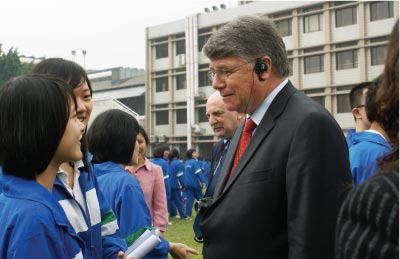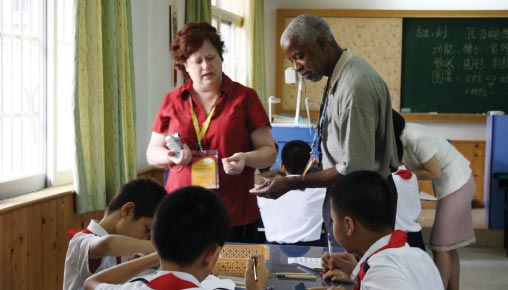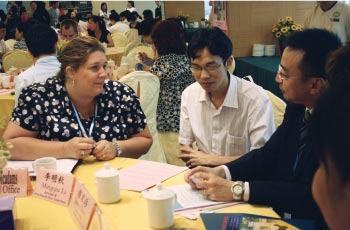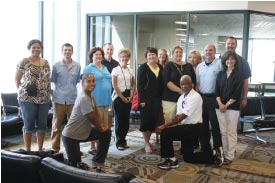
In the movie Dead Poets Society, Mr. Keating (played by Robin Williams) asks his students to climb up on the desk and view the world from a different vantage point. Every year, participants in the Educational Leadership Learning Exchange program, more commonly called ELLE, get a chance to climb up on the desk and see the world differently, metaphorically speaking. As a result of this annual exchange, which began in 2005 between educators in Nashville and in China, many Nashville principals and teachers gain a unique perspective and new approaches to curriculum, leadership, assessment and collaboration.
ELLE just completed its sixth principal leadership exchange in June. Each summer a select group of educational leaders from Metropolitan Nashville Public Schools has traveled to Guangzhou, China, for the opportunity to participate in school visits, college classes and cultural activities. The trip is designed to provide a platform for comparison and sharing of educational philosophies and strategies and sponsored by Vanderbilt, Metropolitan Nashville Public Schools and South China Normal University.
The ELLE platform for comparison of American and Chinese schools is grounded in the six core components used in the Vanderbilt Assessment of Leadership in Education (VAL-ED). These include high standards for student learning, rigorous curriculum, quality instruction, culture of learning and professional behavior, connections to external communities and performance accountability. These components serve as the foundation for daily group reflections and for summary evaluations each participant completes upon returning home. Having this common platform has provided a framework with which to understand more deeply what has been observed. The two-week exchange has three key components: visits to local schools and meetings with principals, teachers, students and parents; lectures and dialogues with researchers on Chinese education, reform policies and implementation challenges; and cultural experiences through sightseeing, events and home visits.

Upon their return, the participants do a critical comparison of what they know is happening in their own schools compared to what they experienced in China. Once they have completed their comparisons, they are asked to summarize their conclusion around the six components. This year, summaries emphasized collaboration between teachers as a common point of comparison between their Nashville classrooms and those observed in China, sometimes regarding very specific classroom applications such as curriculum for English language learners or better use of planning time. Debbie McAdams, executive director of exceptional education for Metro Nashville Public Schools wrote, “We need to develop an open classroom model in which teachers can feel comfortable and supported [by] one another. We do not offer enough opportunities for collaboration in our schools.”
Julius Turnipseed, who teaches science at Nashville School of the Arts wrote, “Honest and open discussions among teachers that are holding each other accountable relieves part of that burden from the principal (it’s not just the principal saying improvements are needed). I believe we should not only be doing more to collaborate with each other, but also in reviewing what is being done in the classroom.”

The importance of partnering in the community was also addressed in some of the summaries. Angela Carr of Head Middle Magnet School noted that: “Principals [in China] ensure a culture of learning and professional behavior in their schools by requiring high quality instruction. Boarding students who do not live close to the school connect the family [to] the community the student comes from. Family members [are brought] in to volunteer at schools.”
Seeing firsthand how education and learning are viewed in China is also a real eye-opener. Lori Likins, first grade teacher at Glenview Elementary wrote, “I was impressed with the culture of learning in China, from the elementary through the high school. The end goal was understood by all.”
There is so much learning that occurs in an experience like ELLE. The distance traveled and the common experiences provide an opportunity to model what a real learning community can be. Many lessons are personal, but the bonds built by the group last a lifetime.
The school visits, the dragon boat races, the sticky rice, the joy on the faces of the children—all of these encounters in Guangzhou leave deep impressions and changed perspectives. Many participants have remarked that this experience changes their lives forever. They look at education and at their students with a new sense of challenge and expectation.

Currently, Metropolitan Nashville Public Schools serve 137 language groups. Diversity has taken on a much broader meaning. Traditionally, professional development can only offer snapshots of varying cultures; there is a great need for educators to experience cross-cultural educational immersion. Betsy Potts, a second grade teacher at Goodlettsville Elementary said, “I think we do many things well, but there are areas where we need to stretch and improve. ELLE is a wonderful platform for sharing ideas across the globe with the ultimate goal being to give students worldwide the best possible education.”
The challenges we face are substantial and very similar. With the world growing more interconnected, the need to build lasting bridges of mutual understanding and cooperation are of increasing importance. Viewing the world of the classroom from a different point of view provides an opportunity for educators to not only experience, but to participate in a significant educational dialogue. That is what ELLE does best.
Tom Ward is director of the Educational Leadership Learning Exchange and a former Metro Nashville principal.